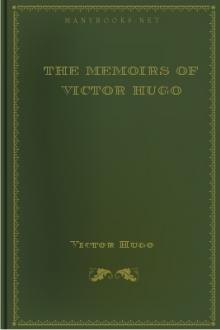Hilda Lessways by Arnold Bennett (some good books to read txt) 📕

- Author: Arnold Bennett
Book online «Hilda Lessways by Arnold Bennett (some good books to read txt) 📕». Author Arnold Bennett
The side entrance gave directly on to a long flight of naked stairs, and up these stairs Hilda climbed into the unknown, towards the redoubtable and the perilous. "I'm bound to be seen," she said to herself, "but I don't care, and I _don't_ care!" At the top of the stairs was a passage, at right angles, and then a glazed door with the legend in black letters, "Q. Karkeek, Solicitor," and two other doors mysteriously labelled "Private." She opened the glazed door, and saw a dirty middle-aged man on a stool, and she said at once to him, in a harsh, clear, deliberate voice, without giving herself time to reflect:
"I want to see Mr. Karkeek."
The man stared at her sourly, as if bewildered.
She said to herself: "I shan't be able to stand this excitement much longer."
"You can't see Mr. Karkeek," said the man. "Mr. Karkeek's detained at Hanbridge County Court. But if you're in such a hurry like, you'd better see Mr. Cannon. It's Mr. Cannon as they generally do see. Who d'ye come from, miss?"
"Come from?" Hilda repeated, unnerved.
"What name?"
She had not expected this. "I suppose I shall have to tell him!" she said to herself, and aloud: "Lessways."
"Oh! Ah!" exclaimed the man. "Bless us! Yes!" It was as if he had said: "Of course it's Lessways! And don't I know all about _you!_" And Hilda was overwhelmed by the sense of the enormity of the folly which she was committing.
The man swung half round on his stool, and seized the end of an india-rubber tube which hung at the side of the battered and littered desk, just under a gas-jet. He spoke low, like a conspirator, into the mouthpiece of the tube. "Miss Lessways--to see you, sir." Then very quickly he clapped the tube to his ear and listened. And then he put it to his mouth again and repeated: "Lessways." Hilda was agonized.
"I'll ask ye to step this way, miss," said the man, slipping off his stool. At the same time he put a long inky penholder, which he had been holding in his wrinkled right hand, between his teeth.
"Never," thought Hilda as she followed the clerk, in a whirl of horrible misgivings, "never have I done anything as mad as this before! I'm under twenty-one!"
III
There she was at last, seated in front of a lawyer in a lawyer's office--her ladyship consulting her own lawyer! It seemed incredible! A few minutes ago she had been at home, and now she was in a world unfamiliar and alarming. Perhaps it was a pity that her mother had unsuspectingly put the scheme into her head!
However, the deed was done. Hilda generally acted first and reflected afterwards. She was frightened, but rather by the unknown than by anything she could define.
"You've come about the property?" said Mr. Cannon amiably, in a matter-of-fact tone.
He had deep black eyes, and black hair, like Hilda's; good, regular teeth, and a clear complexion; perhaps his nose was rather large, but it was straight. With his large pale hands he occasionally stroked his long soft moustache; the chin was blue. He was smartly dressed in dark blue; he had a beautiful neck-tie, and the genuine whiteness of his wristbands was remarkable in a district where starched linen was usually either grey or bluish. He was not a dandy, but he respected his person; he evidently gave careful attention to his body; and this trait alone set him apart among the citizens of Turnhill.
"Yes," said Hilda. She thought: "He's a very handsome man! How strange I don't remember seeing him in the streets!" She was in awe of him. He was indefinitely older than herself; and she felt like a child, out of place in the easy-chair.
"I suppose it's about the rent-collecting?" he pursued.
"Yes--it is," she answered, astonished that he could thus divine her purpose. "I mean--"
"What does your mother want to do?"
"Oh!" said Hilda, speaking low. "It's not mother. I've come to consult you myself. Mother doesn't know. I'm nearly twenty-one, and it's really my property, you know!" She blushed with shame.
"Ah!" he exclaimed. He tried to disguise his astonishment in an easy, friendly smile. But he was most obviously startled. He looked at Hilda in a different way, with a much intensified curiosity.
"Yes," she resumed. He now seemed to her more like a fellow-creature, and less like a member of the inimical older generation.
"So you're nearly twenty-one?"
"In December," she said. "And I think under my father's will--" She stopped, at a loss. "The fact is, I don't think mother will be quite able to look after the property properly, and I'm afraid--you see, now that Mr. Skellorn has had this stroke--"
"Yes," said Mr. Cannon, "I heard about that, and I was thinking perhaps Mrs. Lessways had sent you.... We collect rents, you know."
"I see!" Hilda murmured. "Well, the truth is, mother hasn't the slightest idea I'm here. Not the slightest! And I wouldn't hurt her feelings for anything." He nodded sympathetically. "But I thought something ought to be done. She's decided to collect our Calder Street rents herself, and she isn't fitted to do it. And then there's the question of the repairs.... I know the rents are going down. I expect it's all mother's for life, but I want there to be something left for me when she's gone, you see! And if--I've never seen the will. I suppose there's no way of seeing a copy of it, somewhere?... I can't very well ask mother again."
"I know all about the will," said Mr. Cannon.
"You do?"
Wondrous, magical man!
"Yes," he explained. "I used to be at Toms and Scoles's. I was there when it was made. I copied it."
"Really!" She felt that he would save her, not only from any possible unpleasant consequences of her escapade, but also from suffering ultimate loss by reason of her mother's foolishness.
"You're quite right," he continued. "I remember it perfectly. Your mother is what we call tenant-for-life; everything goes to you in the end."
"Well," Hilda asked abruptly. "All I want to know is, what I can do."
"Of course, without upsetting your mother?"
He glanced at her. She blushed again.
"Naturally," she said coldly.
"You say you think the property is going down--it _is_, everybody knows that--and your mother thinks of collecting the rents herself.... Well, young lady, it's very difficult, very difficult, your mother being the trustee and executor."
"Yes, that's what she's always saying--she's the trustee and executor."
"You'd better let me think it over for a day or two."
"And shall I call in again?"
"You might slip in if you're passing. I'll see what can be done. Of course it would never do for you to have any difficulty with your mother."
"Oh no!" she concurred vehemently. "Anything would be better than that. But I thought there was no harm in me--"
"Certainly not."
She had a profound confidence in him. And she was very content so far with the result of her adventure.
"I hope nobody will find out I've been here," she said timidly. "Because if it _did_ get to mother's ears--"
"Nobody will find out," he reassured her.
Assuredly his influence was tranquillizing. Even while he insisted on the difficulties of the situation, he seemed to be smoothing them away. She was convinced that he would devise some means of changing her mother's absurd purpose and of strengthening her own position. But when, at the end of the interview, he came round the large table which separated them, and she rose and looked up at him, close, she was suddenly very afraid of him. He was a tall and muscular man, and he stood like a monarch, and she stood like a child. And his gesture seemed to say: "Yes, I know you are afraid. And I rather like you to be afraid. But I am benevolent in the exercise of my power." Under his gaze, her gaze fastened on the wire-blind and the dark window, and she read off the reversed letters on the blind.
Like a mouse she escaped to the stairs. She was happy and fearful and expectant.... It was done! She had consulted a lawyer! She was astounded at herself.
In the Market Square it was now black night. She looked shyly up at the lighted wire-blinds over the ironmongery. "I was there!" she said. "He is still there." The whole town, the whole future, seemed to be drenched now in romance. Nevertheless, the causes of her immense discontent had not apparently been removed nor in any way modified.
CHAPTER IV DOMESTICITY INVADED
I
Early in the afternoon, two days later, Hilda came, with an air of reproach, into her mother's empty bedroom. Mrs. Lessways had contracted a severe cold in the head, a malady to which she was subject and which she accepted with fatalistic submission, even pleasurably giving herself up to it, as a martyr to the rack. Mrs. Lessways' colds annoyed Hilda, who out of her wisdom could always point to the precise indiscretion which had caused them, and to whom the spectacle of a head wrapped day and night in flannel was offensively ridiculous. Moreover, Hilda in these crises was further and still more acutely exasperated by the pillage of her handkerchiefs. Although she possessed a supply of handkerchiefs far beyond her own needs, she really hated to lend to her mother in the hour of necessity. She did lend, and she lent without spoken protest, but with frigid bitterness. Her youthful passion for order and efficiency was aggrieved by her mother's negligent and inadequate arrangements for coping with the inevitable plague. She now made a police-visit to the bedroom because she considered that her mother had been demanding handkerchiefs at a stage too early in the progress of the disease. Impossible that her mother should have come to the end of her own handkerchiefs! She knew with all the certitude of her omniscience that numerous clean handkerchiefs must be concealed somewhere in the untidiness of her mother's wardrobe.
See her as she enters the bedroom, the principal bedroom of the house, whose wide bed and large wardrobe recall the past when she had a father as well as a mother, and when that bedroom awed her footsteps! A thin, brown-frocked girl, wearing a detested but enforced small black apron; with fine, pale, determined features, rather unfeminine hair, and glowering, challenging black eyes. She had a very decided way of putting down her uncoquettishly shod feet. Absurdly young, of course; wistfully young! She was undeveloped, and did not even look nearly twenty-one. You are at liberty to smile at her airs; at that careless critical glance which pityingly said: "Ah! if this were my room, it would be different from what it is;" at that serious worried expression, as if the anxiety of the whole world's deficiencies oppressed the heart within; and at that supreme conviction of wisdom, which after all was little but an exaggerated perception of folly and inconsistency in others!... She is not to be comprehended on an





Comments (0)